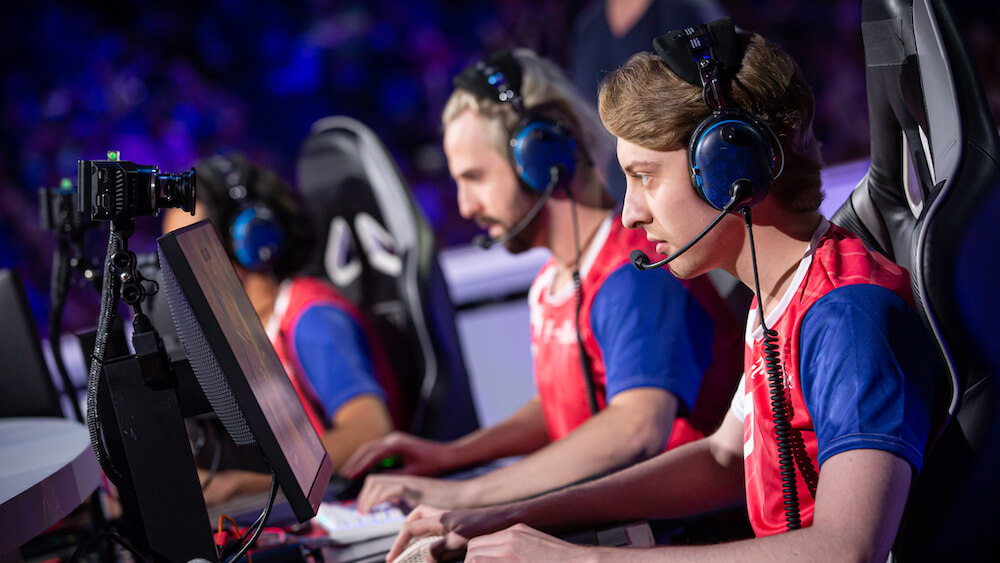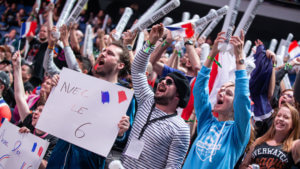
Streamers at BlizzCon 2019, one of the biggest annual events for esports. (Photo Credit Carlton Beener)
Over Presidents’ Day weekend, for $75, sports fans could get a seat at the Washington-versus-Philadelphia matchup in the City of Brotherly Love. That’s not the NBA’s Washington Wizards and Philadelphia 76ers, though. It’s a showdown between Washington Justice and Philadelphia Fusion — part of the Overwatch League, a collection of 20 esports teams with the best Overwatch players on the planet who begin vying for $5 million worth of prizes this month.
“Millennials and Gen Z grew up playing highly competitive video games, and now, they want to watch the best in the world play those games,” said Gary Gonzalez, managing partner and director of strategy at Seattle-based marketing agency Convoke. As Gonzalez, a featured speaker at Destination Showcase in Washington, D.C. on Feb. 5, told Convene, “It’s just like members of other generations who grew up playing basketball or football and want to watch the best athletes in those sports compete.”
Overwatch is one of the names in a growing list of esports tournaments that includes the League of Legends Championship, Fortnite World Cup, the HALO World Championship, and many other popular games. On the surface, esports competitions may seem to have little in common with traditional conferences and meetings, but Gonzalez believes that event organizers can take cues from the surging popularity of esports — an industry predicted to be worth more than $3 billion by 2025 — when thinking about designing an experience for any audience.
“At the end of the day,” Gonzalez said, “you’re still creating an experience for people who are passionate about something.”

Overwatch fans cheering at BlizzCon 2019. (Photo Credit Carlton Beener)
Here are some aspects of esports events that can help inform business event organizers.
Think beyond your main draw. The most successful esports events do more than attract the biggest players in esports, Gonzalez said. “So much more happens” than just the competition, he said. Gonzalez likens the environment at these events to CES and SXSW. “It’s a festival atmosphere and a cultural celebration for people who have never had an IRL [in-real-life] opportunity to gather,” he said. “There are stations where other people can game. Some are dressed up like the characters in the games. There are concerts. It’s so much more than watching the game.”
Think beyond in-person participants and measure the value of your online audience. These events draw crowds. The International, a championship for Dota 2, was held at the Mercedes-Benz Arena in Shanghai, which seats around 18,000 people. However, the online audience far eclipses that audience, and Gonzalez pointed out that the reach creates a big attraction for sponsors that spent around $450 million last year. “Because gaming is a digital-first medium, you can amplify the impact for potential sponsors,” he said. “The broadcast numbers can be anywhere from 10 times to 1,000 times [the size] of the IRL audience.”
That’s a big difference from the traditional events industry, a face-first medium where plenty of organization face hiccups along the road to monetizing their live-streamed programming. To turn those digital broadcasts into dollars, it’s important to take a cue from the esports industry and articulate whether virtual attendees can deliver a meaningful return to potential sponsors.
“One of the biggest misconceptions is that the gaming audience is young [and unwilling to spend],” Gonzalez said. “When you look at the actual data, the average gamer indexes somewhere between 30 and 34, and they over-index on both education and income. It’s why companies like Visa and Geico are sponsoring these events. They can reach a very valuable consumer group in real life and online.”
Opportunities are arising with new venues. That Washington-Philadelphia game? It’s happening at The Met in Philadelphia, a historic opera house that is typically used for concerts — not exactly an ideal fit for high-tech gaming matches. While Gonzalez said that there are not many venues specific to esports currently available, that will change soon. “This is a new economy that is starting to pop up with a lot of entrepreneurs and investment money,” he said. “We’ll have to wait and see how that will play out in the long-term and what the demand will be.”
Part of that future is already taking shape. In Texas, Populous, the architecture firm behind a number of convention centers, created a 100,000-square-foot esports venue in the Arlington Convention Center. In Ohio, an 80-seat venue recently opened at Ohio State University — part of the institution’s undergraduate and graduate program for esports. And a 3,500-seat, $50-million facility in Philadelphia will open in 2021. (Those Overwatch games will move out of the opera house soon enough.)
With these new venues coming online soon, there will be opportunities for them to host other events when esports aren’t in session. The Philadelphia arena has plans for 120 events per year, including TED Talks and concerts. The popularity of esports is adding to the event venue inventory overall.
